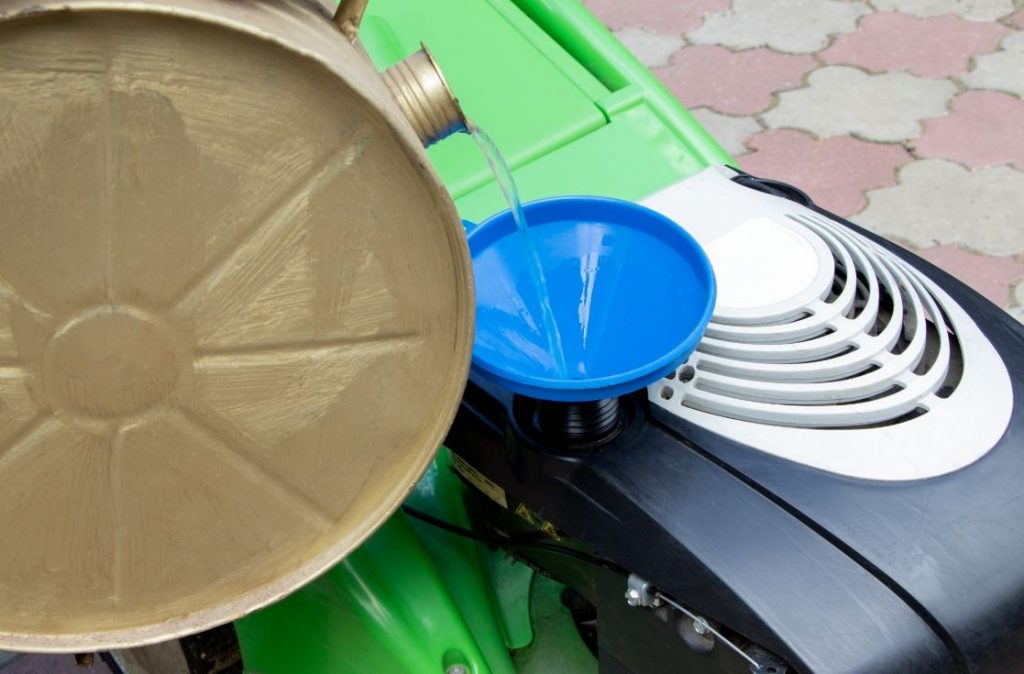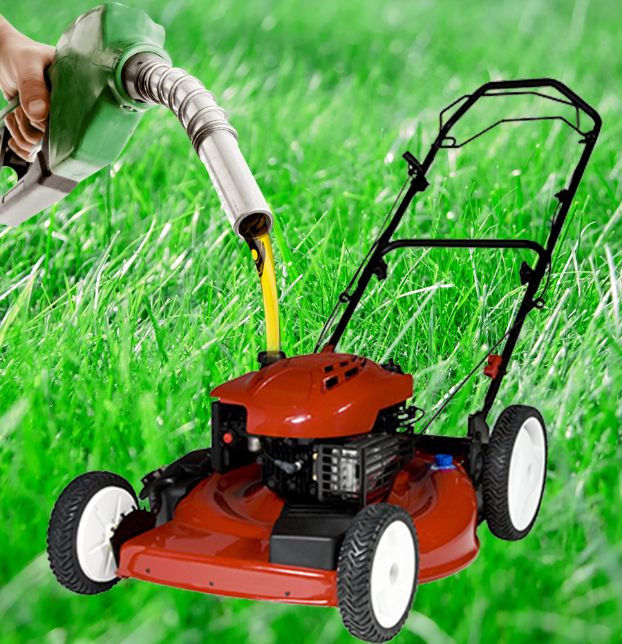
When investing in a lawnmower, many of us forget about how much fuel our lawnmower will use, which will contribute to the running costs of our petrol mower.
The fuel consumption of the average petrol mower could be anything from 1 litre an hour to 1 gallon an hour, these figures can vary massively according to your mowers engine size, the ground you are mowing and how you use your mower, so fuel calculations should be made based on your mower rather than an average.
To understand more about the fuel that your mower uses and its overall consumption, we have put together a short article below that will tell you more about petrol mowers and how they run.

As we mentioned above, fuel consumption will vary according to different mowers and their engine size, for example, a 173cc engine on a mower will require more fuel to run than a 110cc engine.
You will also have to consider other factors such as the speed of your cutting, distance travelled and if your garden has obstacles such as inclines which can place a greater load on the mower.
We have listed out a few variables below to consider when calculating how much fuel your lawnmower would use per hour.
Overall, to calculate your lawnmowers individual fuel consumption you can use an online calculator, or simply mow your garden and see. Some mowers boast a higher efficiency than others, and the more modern push mowers don't use a lot of fuel meaning they have cheaper running costs than the old school petrol models, so consider switching if the consumption of your mower is higher than it should be.

Believe it or not, you can't just use any type of fuel in your mower, doing so could potentially void the warranty of your mower and seriously damage it if you use the wrong one.
For four-stroke engines on mowers, do not mix your fuel with any oil, it is recommended to use a fuel that has no more than 10% ethanol and a minimum of 87 octanes, never use a fuel that has a higher level of ethanol for a small mower's engine.
In terms of a two-stroke engine on your mower, you will need to mix this fuel with some oil, the ratio of fuel to oil will most likely vary according to your mower.
If you are not sure about what type of fuel you should be using in your mower you should check the manual of your mower to see the recommended type, also never store your fuel in your mower for more than 30 days, otherwise, you could risk it going bad.
To prevent your mower's fuel from going bad drain it before storing or add a stabiliser to make it last long till you next use your mower.

There are a couple of tricks and hacks you can be doing when using your mower to help it consume less fuel, we have listed out our best tips below.

Even though we can't tell you the exact amount of fuel your petrol mower will use per hour, we can tell you that electric mowers are cheaper to run than petrol ones.
For example, it is estimated that a petrol mower will cost around £22 to run annually while a battery mower would only cost around £4 to run a year, however, this varies according to lots of factors.
We have compared both petrol and electric mowers below so as you can see how they would benefit you if you are undecided about which mower type is right for you.
Petrol mowers may cost a little more to run than electric ones but make up for it in terms of power. For example, petrol mowers will perform much better on a garden with difficult terrain and inclines than an electric.
They also have more variety on the market and tend to have more professional features such as rollers and larger cutting blades.
The obvious downfalls of petrol mowers are their running costs and the fact they are very polluting to the environment, they also tend to weigh quite a bit and are very noisy.
Electric lawnmowers on the other hand (in this case we are talking about the battery), are cheaper to run than petrol models and have no effects on the environment pollution wise. These models are great for people with smaller gardens and are very quiet to use too.
The drawbacks of electric mowers are that they are not as powerful as petrol mowers, hence why riding mowers are petrol ran and professionals still opt for petrol power.
Overall, if you aim to save money from the running costs of your lawnmower then you should go for an electric model, however, if you have a larger garden to tackle with lots of variable terrains and want a more professional finish to your lawn, you might consider spending more on a petrol mower.
What would happen if I put too much gas in my petrol lawnmower?
If you put too much fuel in your lawnmower then you will likely have some running problems with the mower, this can be easily remedied however by just draining the mower.
Are two-stroke or four-stroke engines better?
Both engines have their pros and cons, for example, a two-stroke engine tends to be cheaper and lighter than a four-stroke engine but is also less durable and not as good for the environment.
Do petrol mowers have a higher running cost than electric ones?
Yes, petrol mowers do cost more to run than electric mowers as they need fuel for power and a lot of maintenance to keep the engine in a good condition. Many people still go for petrol mowers however as they are better for cutting a variety of terrain.
Overall, the amount of petrol your mower uses per hour will vary according to the variables we mentioned at the start of our article, you can always use an online calculator to get an estimate if you want to check the efficiency of a mower before purchasing.
If your fuel consumption is too high then we recommend switching to a newer mower or following the tips above to try and reduce how much fuel is being used, maintaining the mower's engine will always help it work more efficiently.